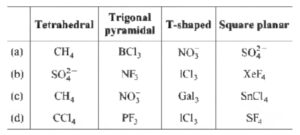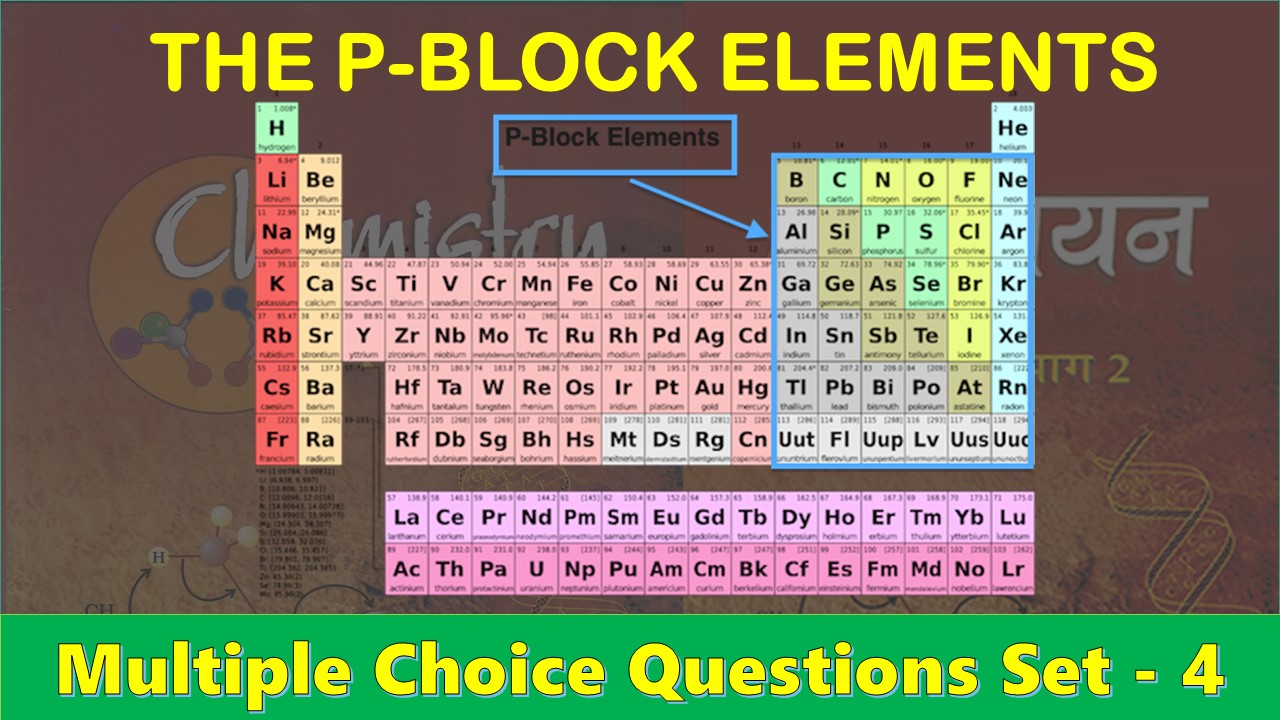CBSE Class 12 The p Block Elements Multiple Choice Questions with Answers. MCQ Questions Class 12 The p Block Elements with Answers Is Prepared Based on Latest Exam Pattern. Students can solve NCERT Class 12 The p Block Elements MCQs with Answers to know their preparation level.
Students who are searching for NCERT MCQ Questions for Class 12 The p Block Elements with Answers are compiled here to get good practice on all fundamentals. Know your preparation level on MCQ Questions for Class 12 The p Block Elements with Answers. You can also verify your answers from our provided MCQ Class 12 The p Block Elements with Answers. So, ace up your preparation with MCQ of Class 12 Chemistry Examinations.
MCQ Questions Class 12 The p Block Elements with Answers - Set - 4
Question 1:
A compound ‘X’ upon reaction with H2O produces a colourless gas ‘Y’ with rotten fish smell. Gas ‘Y’ is absorbed in a solution of CuSO4 to give Cu3P2 as one of the products. Predict the compound ‘X’.
(a) Ca3P2
(b) NH4Cl
(c) As2O3
(d) Ca3(PO4)2
Correct Answer – (A)
Question 2 :
Argon is used
(a) in filling airships
(b) to obtain low temperature
(c) in high temperature welding
(d) in radiotherapy for treatment of cancer
Correct Answer – (C)
Question 3 :
Which of the following is the life saving mixture for an asthma patient?
(a) Mixture of helium and oxygen
(b) Mixture of neon and oxygen
(c) Mixture of xenon and nitrogen
(d) Mixture of argon and oxygen
Correct Answer – (A)
Question 4 :
Which of the following pairs contains isoelectronic species ?
(a) Be and Li+
(b) p+ and s–
(c) N2- and Ne
(d) O2- and Na+
Correct Answer – (D)
Question 5 :
The molecular ion XF2 bas three pairs of non-bonding electrons around the central atom. The bond angle F—X—F will be closest to
(a) 180°
(b) 120°
(c) 109°
(d) 90°
Correct Answer – (A)
MCQ Questions Class 12 The p Block Elements with Answers
Question 6:
Each of the following is true for white and red phosphorus except that they
(a) are both soluble in CS2
(b) can be oxidised by heating in air
(c) consist of the same kind of atoms
(d) can be converted into one another
Correct Answer – (A)
Question 7:
Which one of the following reaction of xenon compounds is not feasible?
(a) XeO3 + 6HF → XeF6 + 3H2O
(b) 3XeF4 + 6H2O → 2Xe + XeO3+ 12HF + 1.5 O2
(c) 2XeF2 + 2H2O → 2Xe + 4HF + O2
(d) XeF6 + RbF → Rb[XeF7 ]
Correct Answer – (A)
Question 8:
Which of the following sets has the atoms and/or ions in the correct order of increasing size ?
(a) Ne < F– < O2-
(b) Br– < Cl– < F–
(c) Na+ < Mg2+ < Al3+
(d) P < S < Cl
Correct Answer – (A)
Question 9:
Which of the following sets have correctly matched each molecule or ion and its geometry ?

Correct Answer – (B)
Question 10:
The structure of XeOF4 is
(a) trigonal bipyramidal
(b) square planar
(c) square pyramidal
(d) pyramidal
Correct Answer – (C)
- NCERT Solutions Class 11 Chemistry Chapter 1 : Some Basic Concepts of Chemistry
- NCERT Solutions Class 11 Chemistry Chapter 2 : Structure Of The Atom
- NCERT Solutions Class 11 Chemistry Chapter 3 : Classification of Elements and Periodicity in Properties
- NCERT Solutions Class 11 Chemistry Chapter 4 : Chemical Bonding and Molecular Structure
- NCERT Solutions Class 11 Chemistry Chapter 5 : States of Matter
- NCERT Solutions Class 11 Chemistry Chapter 6 : Thermodynamics
- NCERT Solutions Class 11 Chemistry Chapter 7 : Equilibrium
- NCERT Solutions Class 11 Chemistry Chapter 8 : Redox Reactions
- NCERT Solutions Class 11 Chemistry Chapter 9 : Hydrogen
- NCERT Solutions Class 11 Chemistry Chapter 10 : The s-Block Elements
- NCERT Solutions Class 11 Chemistry Chapter 11 : The p-Block Elements
- NCERT Solutions Class 11 Chemistry Chapter 12 : Organic Chemistry: Some Basic Principles and Techniques
- NCERT Solutions Class 11 Chemistry Chapter 13 : Hydrocarbons
- NCERT Solutions Class 11 Chemistry Chapter 14 : Environmental Chemistry




